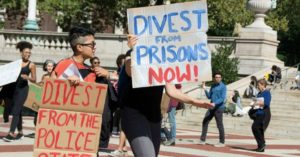
Why a renowned school — or any college for that matter — would want to be tied to a racist entity that has suppressed American citizens in general, African-Americans in particular, more than any place in the world, is beyond the students’ grasp. And so, they are tireless in their efforts to break the connection.
But it has not been easy. They struggled to get Columbia Prison Divest galvanized, as the school’s administration ignored the group’s initial petition to pull out of its $8 million investment in Corrections Corporation of America, the country’s largest private prison company. Columbia also has shares in other behemoths of the private security industry, the GEO Group and G4S. The CPD called for immediate divestment from the groups and a pledge not to reinvest in the future.
Frustrated with not receiving a formal response, the CPD in November staged what one of the group’s leaders, Dunni Oduyemi, called an “intervention.” The members approached school president Lee Bollinger on his way to teach a class until he committed to meeting with the organization.
The group was impressed with Bollinger’s receptiveness — Oduyemi told The Nation that the president has “continued to express interest in using Columbia, its legacy, its prestige, to address racial inequality.” Ultimately, however, Bollinger said the call on divesting is not his. According to Colombia’ protocol, requests must first be approved by a finance subcommittee, and then by the Board of Trustees.
Columbia created an Advisory Committee on Socially Responsible Investing 15 years ago to tackle concerns like this. It is a body of students, faculty and alumni, charged with evaluating any petitions for changes in investment strategy. Calls for divestment are assessed according to strict criteria, which requires “broad consensus within the University” on the issue and stipulates that divestment should be shown to be “more viable and appropriate” than any other possible policy response.
Oduyemi sees all that as bureaucracy. “As a campaign, we recognize that one of Columbia’s strategies in dealing with divestment is to delay the process as much as possible,” she said to The Nation. Another member of Columbia Prison Divest called meetings with the advisory committee “wrought with confusion, misunderstanding, and miscommunication.”
In an e-mail to The Nation, a university spokesperson said Columbia “has a strong set of procedures around ACSRI that include research, discussions and public meetings, which are thorough and deliberative (and thus take time).” The university doesn’t comment on investment strategy except in its annual report.
Gabriela Pelinger, another leader, told The Nation that she sees an association with prison as “tangible” evidence of a school run afoul of moral strength.
“You can say, ‘Look at our school,’” Pelinger said. “Our education is profiting off of the incarceration of marginalized communities, and that directly allows us to have access to these resources.’”
Bollinger has agreed to convene with the divestment group this month. Many of the students will be gearing up to leave Columbia’s campus for good. But April also brings the 40th anniversary of the apartheid divestment movement, and activists are looking forward to an event that will bring both generations of agitators together.
“It does feel like we are in a kind of moment,” Oduyemi says. “Hopefully that will keep building into a movement.”


